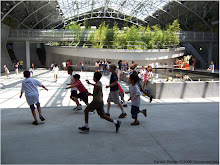We are, to be honest, proud of this recognition. Gyroscope began working with the Chicago Children's Museum in 2003. At the time, we were doing a combined architecture and visitor experience master plan. As part of that we, together with the museum and the Erikson Institute, researched and wrote the Standards of Excellence: A Model for the Chicago Children's Museum. That project was a chance to step back and survey the early learning/early childhood community at large for ideas, trends, issues, and leadership opportunities that might be appropriate for CCM.
That study was the basis a few years later of the NSF grant, Partnership for Playful Learners which funded Skyline. The PPL grant proposed to study 2 things: (1) how to use design strategies to increase parent participation in the exhibit and (2) how to create a public exhibit that can also serve as a research lab contributing new understanding to the field of informal science learning.
Skyline is a demonstration project - an opportunity to implement both of these ideas and see how they function over years of operation. It has been successful on both these fronts. According to the summative evaluation:
"Adults' enthusiasm for the exhibition's design might help to explain why more adults were willing to accept the challenge of working with and teaching their children and why they described this collaboration as extremely satisfying."
The idea that design can influence behavior is not new - urban planners, public artists, industrial designers, environmental psychologists and others hold this idea as a central tenet of what they do. But in museums, it is surprisingly under appreciated. Design is seen as a delivery mechanism. We at Gyroscope believe that the environmental nature of museum experiences is incredibly powerful and that design can be harnessed to increase interaction, support collaboration, help visitors take risks, and increase dwell times. And through its influence on visitor behavior we believe design has a lot to do with visitors' learning.

In Skyline, the goal was specifically to support the learning behaviors we wrote about in the Standards, and to engage adults in specific behaviors as well that would support their children's learning.
The second goal - of creating an exhibit that can contribute new knowledge to the field - is similarly ambitious. There are other exhibits that look at how people learn, and labs set up in exhibitions. But Skyline is meant to be used as the research environment in informal science learning. The idea of learning about learning applies to the museum, not just to visitors.
We loved working on this project, and Chicago Children's Museum was a wonderful partner. I have written about the exhibit development process before so I will just take a minute to acknowledge that some of what made the collaboration so successful was their willingness to take risks with us, ask lots of questions, and keep us focused on creating a sustainable and deeply exciting visitor experience. We are immensely glad to share this award with them. As Ron said:
"Working together, we re-imagined a beloved exhibit specifically to encourage family interaction and creative problem solving. The unique design strategies for Skyline fostered
and supported these goals, while creating an artful and robust exhibit experience."
Next time you are in Chicago we urge you to visit.








No comments:
Post a Comment